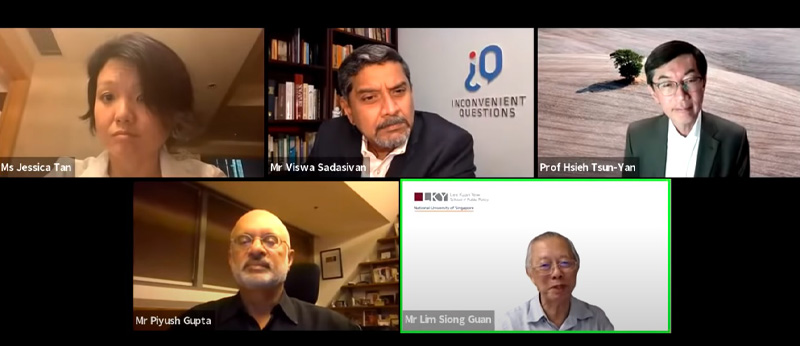At the IQ Special Panel Discussion on Post-COVID: Leadership beyond Management that lasted a full two hours, prominent leaders Mr Piyush Gupta, CEO and Director of DBS Group; Ms Jessica Tan, Group Co-CEO of Ping An Group; Mr Lim Siong Guan, former head of Civil Service and Prof Hsieh Tsun-Yan, founder of McKinsey Leadership Practice and CEO Counsellor, delivered their candid and personable take on the topic of leadership in an organisation.
Close to 600 members from NUSS and the NUS community including faculty, students and alumni, tuned into the webinar organised by NUSS and Strategic Moves in collaboration with NUS, on 24 September 2020.
Mr Gupta was the first to share his insights. He gave a robust presentation on how leadership has evolved and changed with circumstances such that in the last couple of years in the corporate world, there was the idea of clarity of purpose and intent, and leaders need to consider impact on society beyond delivering shareholder value.
Mr Gupta also highlighted the shift from vertical leadership to horizontal leadership. Top down leadership was no longer effective as compared to collaborative leadership which taps on the energy and ideas of the young. This could be applied to the quality of Singapore’s civic society which needs to evolve from whole of government to whole of nation with a more participative form of engagement, he opined.

While leaders might have relied on their gut instinct in the past, leaders need to be more data driven, said Mr Gupta. Leaders need to know how to leverage data as data has become so powerful with its ability to capture patterns that escape the human eye. Then there was the importance of applying judgement and human instinct when using data. “The big questions of our age are going to be ‘’what makes us human beings?’ or ‘why are we different from machines?’ which are questions on “ethics and morality”, he said.
Mr Lim summarised leadership in six words: “think people”, “think future” and “think excellence”. On the first quality, he explained that leaders have to think about the people they serve and motivate people to give them a sense of purpose running the organisation. “Think future” is a “responsibility that cannot be contracted out”, especially for government leaders who have to think about preparing for the future, particularly during COVID-19 where they need to confront unknowns – a big challenge for leaders as they need to expect to deal with the unexpected, said Mr Lim. On excellence, Mr Lim explained that leaders need to run the organisation such that each person becomes the best he or she can be.
China-based Ms Jessica Tan, Group Co-CEO at Ping An Group, one of the largest financial services company in the world, shared her personal journey having worked in 15 countries in the course of 20 years. A consultant before joining Ping An, Ms Tan currently manages 11 companies under the group. Driving transformation in the company, she described the company culture as “driven with a can-do mindset” and having an open environment where employees voice their feedback and opinions freely. Ms Tan opined that leaders see opportunities and need to be genuine. A leader should be open about his or her flaws and guided by the implicit understanding that he or she wanted the best for the company, said Ms Tan.
Prof Hsieh opined the importance for leaders to be centred and fully present in times like these when the world order is destabilised due to COVID-19. With geopolitical risks, a post-COVID world may not see things settling down to a new normal. He explained that there will be a new disorder in which uncertainty is a constant which has implications for leadership in which “nobody knows” and could not anticipate in the business world. “Courage”, “compassion” and “creativity” are other qualities of a leader to bring out his better self, based on a set of guided principles – being flexible and adaptive but rigid in principles.
Moderator Mr Viswa Sadasivan, Strategic Moves’ CEO and former Nominated Member of Parliament, wrapped up the evening’s discussion of what seem to be echoed among the panellists on what good leadership looks like in this day and age – leaders should not only be purpose-driven, but also values-driven.
Mr Sadasivan quoted famous physicist Albert Einstein, “Great spirits have always encountered opposition from mediocre minds”. Similarly, leaders should provide opportunities and instil a culture where people are inspired and unafraid to explore and shake up the status quo. And as the new world is filled with unpredictability and uncertainty, being comfortable and adaptable with knowledge gaps and having a moral compass as a guiding factor are also important traits.
Missed our webinar? Watch it here







